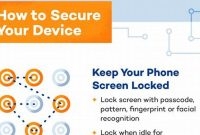If you’re looking for a way to lock someone’s phone for whatever reason, it can be an easy task to take care of. Whether you want to protect your personal information or limit someone’s access to their device, locking a phone can be accomplished in a matter of minutes. With a few simple steps, you’ll be able to prevent someone from using their phone without your permission. In this article, we’ll be outlining the steps to lock someone’s phone and keep it safe.

How to Lock Someone’s Phone Without Passcode
Locking someone’s phone without a passcode is not always an easy task. However, it is sometimes necessary to keep that person’s device safe or protect the information inside it. Here are a few methods that can help you learn how to lock someone’s phone without a passcode.
Using Find My Phone
You can easily lock someone’s phone using “Find My Phone” feature that is available on both Android and iPhone devices.
- For Android devices, go to the Google Find My Device page and select the device you want to lock. Click on “Secure Device” and then follow the instructions to create a new password. After you do that, the device is then locked, and the only way to access it will be to enter the newly created password.
- For iPhone devices, you can use the “Find My” app to lock the device. Open the app, select the lost or stolen iPhone, tap on the “Actions” menu and then choose “Lost Mode.” You can then enter a phone number and a message that will be displayed when someone finds the phone. This will lock the phone until someone enters the passcode that you set up.
Factory Reset
If the above method does not work, you can also try a factory reset. This method requires access to the phone, but you will not need the passcode to complete it. A factory reset will wipe out all the data on the device, including any passwords or lock patterns.
It’s important to note that factory resetting someone else’s phone can have legal implications and should only be done in emergencies.
Is It Legal to Lock Someone’s Phone?
Locking someone’s phone without their consent is generally illegal and can result in legal consequences. However, there are certain situations when it can be done legitimately. Here are some scenarios when it is legal to lock someone’s phone:
1. Stolen Phones
When a phone is stolen, locking it remotely can prevent the thief from accessing the personal information of the real owner. This is a legitimate reason to lock someone’s phone. In fact, most modern smartphones have built-in features that allow users to remotely lock their phones in case they get stolen. This way, the phone can be protected until it’s recovered or wiped clean of all data.
2. Parental Control
Parents who pay for their child’s phone and want to restrict access to certain features or websites can legally use parental controls to lock their child’s phone. This can be done to prevent children from accessing inappropriate content or to control their phone usage. However, it’s important to have a conversation with children and establish clear boundaries before implementing parental controls.
Parents should also inform their children about the purpose of the parental controls and be transparent about what is being restricted and why. Establishing trust and open communication is key to a healthy parent-child relationship.
3. Employer-Employee Relationship
Employers have the right to enforce certain policies regarding phone usage during work hours or using company-provided phones. In some cases, employers may lock their employees’ phones to prevent them from using it for personal reasons during work hours, or to protect sensitive company information.
However, it’s important for employers to inform their employees beforehand about any restrictions or monitoring that will be implemented. It’s also crucial to respect employees’ privacy and avoid invasive measures.
Overall, locking someone’s phone without their consent can result in legal consequences and should only be done legitimately, such as in the case of stolen phones, parental control, or employer-employee relationship.
How to Lock Someone’s Phone Remotely
Locking someone’s phone remotely may seem like a daunting task, but with the right software, it can be done in just a few simple steps. Some of the popular software to lock someone’s phone remotely include Google Find My Device, Apple’s Find My, and third-party apps like Cerberus, among others.
Google Find My Device
Google Find My Device is a free service from Google that allows users to remotely lock their Android device. Here’s how to do it:
- Open the Google Find My Device website on your computer or another device.
- Log in to the account associated with the phone you want to lock.
- Select the phone you want to lock from the list of devices.
- Click on the “Secure Device” option on the right-hand side of the screen.
- Enter your password and click on the “Lock” button to lock the device.
Apple’s Find My
Apple’s Find My service is a great way to remotely lock a lost or stolen iPhone, iPad, or other Apple device. Here’s how to use it:
- Open the Find My app on another iOS device or visit iCloud.com on a computer.
- Sign in with your Apple ID and password.
- Select the device you want to lock from the list of devices.
- Click on the “Lost Mode” button and follow the prompts to set a passcode and display a message on the device’s screen.
- Click on the “Enable” button to lock the device.
Cerberus
Cerberus is a third-party app that can be installed on Android devices and provides a way to remotely lock, track and even wipe a lost or stolen device. Here’s how to use Cerberus:
- Download and install the Cerberus app from the Google Play Store on the target device.
- Log in to the Cerberus website using the same Google account used to install the app.
- Select the phone you want to lock from the list of devices.
- Click on the “Lock” button and follow the prompts to set a passcode.
- Click on the “Lock” button again to lock the device.
What Happens After You Lock Someone’s Phone?
Locking someone’s phone is a common practice for individuals who want to keep their personal data secure from unauthorized access. By locking the phone, you prevent the other person from using it until you unlock it with a pre-set passcode or fingerprint. The following are the consequences that follow locking someone’s phone:
The Phone Will Be Unable to Access Data
After locking the phone, the other person won’t be able to access any content on it, including the contacts, messages, media files, and applications. Even if they know the phone’s passcode, it won’t work if the device is out of reach or in a locked state. This means that your personal and sensitive data will remain secure from unauthorized access.
Emergency Calls Only
When someone attempts to use a locked phone, they can only make emergency calls. This is useful if they require urgent medical assistance or need to report a crime. They can access the phone’s emergency dialer and contact the relevant authorities without having to unlock the device or enter the passcode, ensuring that they can get help quickly.
The Phone User Will Receive a Notification
Upon trying to unlock the phone, the person will receive a notification that the device is locked. This notification might include a custom message from the phone owner detailing what to do next. For instance, you may include a message like “Please return this phone to its rightful owner” or “Please contact me if you find this phone”. This notification serves as a reminder to the person that they are using a phone that doesn’t belong to them, prompting them to take appropriate action.
Custom Message on Lock Screen
You can also set a custom message on the phone’s lock screen that displays when someone attempts to unlock it. This way, you can communicate more information to whoever tries to unlock your phone. For example, you may include a message like “This phone is stolen, please return it to the nearest police station” or “Please contact me at 123-456-7890 if you find this phone.” Such messages can be displayed even when the phone is lost or stolen, helping increase the chances of the device being returned to its rightful owner.
Can You Unlock a Locked Phone?
If you forgot the password or PIN of your phone or if it got locked by mistake, you might be wondering how to unlock it. Luckily, there are several ways to unlock a locked phone:
Using a Backup Password
If you set up a backup password or PIN for your phone, you can use it to unlock your device. The backup password is normally the same as your Google account password.
Using a Fingerprint
If you set up a fingerprint on your phone, you can use it to unlock your device. This is a convenient way of unlocking your phone quickly and easily.
Using a Security Question
If you set up a security question on your phone, you can use it to unlock your device. This is a good option if you can’t remember your backup password or PIN.
Using Third-Party Apps
There are several third-party apps available that can help you unlock a locked phone. However, be cautious when using these apps as they may contain viruses or malware.
Bringing it to the Phone Carrier
If you are still unable to unlock your phone, you can bring it to your phone carrier for assistance. They will be able to help you unlock your device, but you may have to provide proof of ownership.
How to Prevent Someone from Locking Your Phone
If you have a smartphone, securing it is important to prevent unauthorized access to your device. This includes preventing someone from locking your phone without your permission, which can easily lead to data breaches or identity theft. To ensure the safety and security of your device, follow these simple steps to prevent someone from locking your phone:
Set a Complex Passcode
One of the simplest ways to prevent someone from locking your phone is by setting up a complex passcode. This way, even if someone tries to guess it, it will take a longer time to crack the password. Avoid using easy-to-guess passwords such as 1234 or a birth date; instead, use a combination of letters, numbers, and special characters.
Enable Two-Factor Authentication
You can also enable two-factor authentication on your device to ensure an added layer of security. This will require a second form of verification, such as a fingerprint or facial recognition, before accessing the phone. This extra step can help to prevent unauthorized access.
Use Biometric Security
Biometric security is another way to prevent someone from locking your phone without your permission. This involves using technologies such as facial recognition, fingerprints, and iris scanning to unlock your device. This method is more secure than passcodes as it requires a unique physical characteristic to access the phone.
Be cautious when sharing your device with others, especially strangers or someone you don’t trust. It’s easy for someone to quickly lock your phone if you’re not paying attention. Additionally, avoid giving someone your passcode or fingerprint to access your device.
Keep Your Device in Your Sight
Prevent someone from locking your phone by keeping your device in your sight always. Never leave your phone unattended in public or with someone you don’t completely trust, and always be aware of your surroundings while using your phone in public areas.
Use a Security App
Consider using a mobile security app that can prevent unauthorized locking of your phone. These apps can also provide additional features such as tracking your phone and remotely wiping data if it is lost or stolen.
Frequently Asked Questions
| Questions | Answers |
|---|---|
| Can I lock someone’s phone without their permission? | No, it is not legal to lock someone’s phone without their explicit permission or authority. |
| What should I do if my phone is locked? | Contact your phone carrier or the manufacturer of your phone to seek assistance in unlocking it. |
| Will locking someone’s phone protect it from theft or damage? | No, locking someone’s phone can only prevent unauthorized access to the device, but it will not physically protect it from theft or damage. |
| Can I lock my own phone remotely? | Yes, some phone models have built-in security features that allow users to remotely lock their own phones in case of loss or theft. |
| Is there any way to unlock a phone without a passcode or biometric data? | No, for security reasons, phones are designed to only be unlocked with the correct passcode or biometric data (such as fingerprint or facial recognition). |
Thanks for Reading!
We hope that this guide on how to lock someone’s phone has been helpful to you. Remember to always use this power responsibly and only with the permission or authority of the phone’s owner. If you have any questions or comments, feel free to leave them below. And don’t forget to visit our website again for more tips and tricks!





